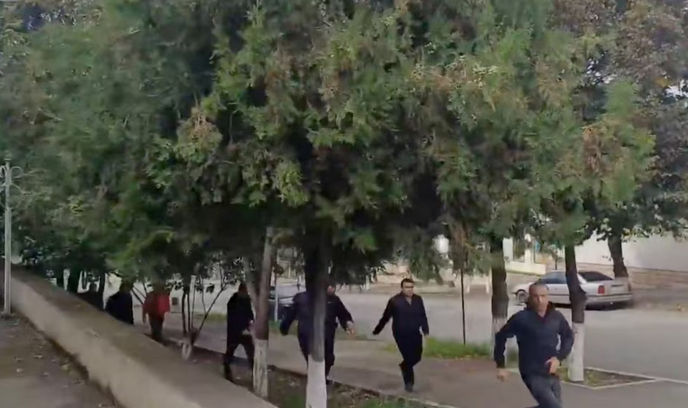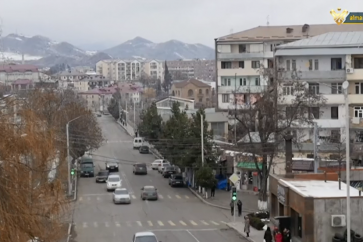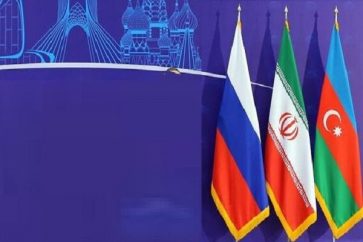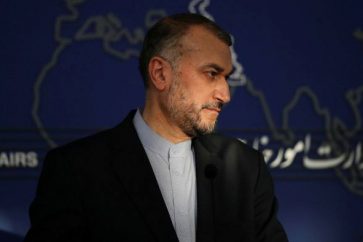After weeks of bloody clashes and a blockade of Nagorno-Karabakh, Azerbaijan on September 19 said it had launched an “anti-terrorist operation,” a major escalation in hostilities with Armenia as the breakaway region already teeters on the brink of a humanitarian crisis after being blockaded for more than eight months.
The shelling started shortly after Baku accused what it called “Armenian sabotage groups” for the two separate explosions that killed four military personnel and two civilians in areas of Nagorno-Karabakh that are under the control of Russian peacekeepers.
Ethnic Armenians inside Nagorno-Karabakh quickly took to social media with posts of video and accounts saying the de facto capital, Stepanakert, was under bombardment. There were no immediate details on damage or casualties.
Azerbaijan’s Defense Ministry said in a statement that “only legitimate military targets are being destroyed,” while the Foreign Ministry said the only way for peace in the region was the complete withdrawal of Armenian forces in the region.
Armenia’s Defense Ministry, however, disputed Baku’s statement, saying the country had no forces in Nagorno-Karabakh and that Baku’s offensive “violated the cease-fire along the entire line of contact with missile-artillery strikes.”
Prime Minister Nikol Pashinian immediately convened a meeting of Armenia’s Security Council.
“Russian peacekeeping troops stationed in Nagorno-Karabakh will take clear and unequivocal steps to stop Azerbaijan’s aggression,” Armenia’s Foreign Ministry said in a statement, referring to the cease-fire agreement Moscow brokered between Yerevan and Baku after the two sides fought a six-week war in late 2020 over the region, leaving some 7,000 people dead.
Russian Foreign Ministry spokeswoman Maria Zakharova told journalists in Moscow that Russia was worried by the escalation but that its peacekeepers in the region would continue their mission. She added that Moscow had only “several minutes” notice before Baku launched its offensive.
The European Union’s top diplomat, Josep Borrell, condemned the operation and called on Azerbaijan to stop military activities in Nagorno-Karabakh, while saying Brussels remained committed to facilitating dialogue to bring a lasting peace to the region.
Nagorno-Karabakh-based independent journalist Marut Vanian confirmed to RFE/RL that Azerbaijan was “intensively” shelling the region.
“At this moment, explosions are heard in Stepanakert. My children and parents quickly got down into the basement. From my balcony I hear the sounds of explosions from [the regional city of] Sushi [known in Azeri as Susa]. The explosions can be heard from different sides. The first were very close. They do not stop,” Vanian said.
Metakse Hakobian, the secretary of the opposition Justice faction in Nagorno-Karabakh’s de facto parliament, told RFE/RL that Stepanakert “is being bombarded from all sides.”
“People are now separated from their children, children are separated from parents. It is a terrible situation, there is no gasoline to go and look for the children,” Hakobian said, referring to a lack of gasoline because of a blockade of the main route into Nagorno-Karabakh from Armenia that started in December.
Artak Beglarian, former minister and and ex-ombudsman of Nagorno-Karabakh, called the attacks “the bloody stage of the genocide” of Nagorno-Karabakh people and called on Russia, the United States, and the European Union to stick to their guarantees for peace and security in the breakaway region.
The situation escalated in the region just one day after humanitarian aid delivery for ethnic Armenians in Nagorno-Karabakh resumed after Nagorno-Karabakh’s de facto authorities agreed to allow Russian-provided aid to be delivered directly from Baku-controlled territory via the Agdam road.




